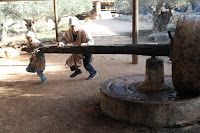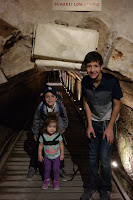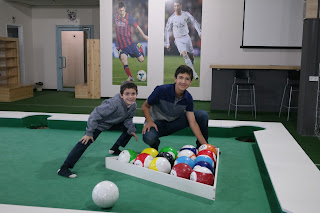 So, now I had to figure out what to do in the morning. I decided that since Rosh Hanikra did not work out on our way up, we will do it in the morning and work our way down the rest of the day. It was about an hour and 15 minute drive to Rosh Hanikra, which is at the border with Lebanon.
So, now I had to figure out what to do in the morning. I decided that since Rosh Hanikra did not work out on our way up, we will do it in the morning and work our way down the rest of the day. It was about an hour and 15 minute drive to Rosh Hanikra, which is at the border with Lebanon. We took the steep, but short cable car ride down to the grottos. They had an English movie for us to start with, which was interesting enough. We learned about the natural formation of the area as well as the man made tunnels from the time of Alexander the Great. We also found out that the train tracks that we could see in the ground were made by the British, but destroyed by the Haganah when they heard that the Lebanese were going to use them in an attack against Israel. We then explored the grottos and tunnels and paths that traversed the mountain. The water was a clear blue- turquoise. As much as we couldn't see through the Jordan River, we could see the bottom of the bay through the Mediterranean Sea. Popscicles and ice cream were in order once again as we headed out to our next stop.
We took the steep, but short cable car ride down to the grottos. They had an English movie for us to start with, which was interesting enough. We learned about the natural formation of the area as well as the man made tunnels from the time of Alexander the Great. We also found out that the train tracks that we could see in the ground were made by the British, but destroyed by the Haganah when they heard that the Lebanese were going to use them in an attack against Israel. We then explored the grottos and tunnels and paths that traversed the mountain. The water was a clear blue- turquoise. As much as we couldn't see through the Jordan River, we could see the bottom of the bay through the Mediterranean Sea. Popscicles and ice cream were in order once again as we headed out to our next stop. Our next stop of the day was to Kfar Kedem. Here we go to experience life as in the time of the Mishna. We dressed up in tunics and head scarves. Our guide Amir took us through time (more explanatory than role playing imagination). He explained the religious significance behind what we were wearing and doing. Since it is nearly Chanuka one of our options was to make olive oil. We went to a small area with some olive trees. They had several real ancient olive presses and oil collecting stones. We gathered olives and pressed them. He showed us how to work the various oil collecting tools. Next we went to a small wheat field mock up. We learned about planting and harvesting wheat. He connected it to the laws of Shabbos and the laws of a field. He gave us some wheat kernels and brought us to an ancient grinding/milling stone. Next we made fresh pita on an outdoor oven. After that we went into the tented area to enjoy more pita, fresh hummus and techina with olive oil and spices, olives that they cured there on site, fresh dates and herbal tea. Yum!
Our next stop of the day was to Kfar Kedem. Here we go to experience life as in the time of the Mishna. We dressed up in tunics and head scarves. Our guide Amir took us through time (more explanatory than role playing imagination). He explained the religious significance behind what we were wearing and doing. Since it is nearly Chanuka one of our options was to make olive oil. We went to a small area with some olive trees. They had several real ancient olive presses and oil collecting stones. We gathered olives and pressed them. He showed us how to work the various oil collecting tools. Next we went to a small wheat field mock up. We learned about planting and harvesting wheat. He connected it to the laws of Shabbos and the laws of a field. He gave us some wheat kernels and brought us to an ancient grinding/milling stone. Next we made fresh pita on an outdoor oven. After that we went into the tented area to enjoy more pita, fresh hummus and techina with olive oil and spices, olives that they cured there on site, fresh dates and herbal tea. Yum! Our final activity was donkey riding. Amir taught us how to hold the reins of the donkey to guide it. He taught us the voice commands for getting the donkey to walk and stop. We lead each other around the corral. It was a much more comfortable and soothing ride than the camels, but we all agreed we are glad we are in the days of automobile, even the tin can on wheels we are renting.
Our final activity was donkey riding. Amir taught us how to hold the reins of the donkey to guide it. He taught us the voice commands for getting the donkey to walk and stop. We lead each other around the corral. It was a much more comfortable and soothing ride than the camels, but we all agreed we are glad we are in the days of automobile, even the tin can on wheels we are renting. Our next stop comes with an "Only in Israel" story. Atara has a wubanub (a pacifier attached to a stuffed animal) She likes regular pacifiers too, but seems to lose at least one every two days. The wubanub seems to hang out with us for several months. For some reason only known to her she decided to bit off the tip to her bear wubanub. Now, I could have decided that it is too bad for her and now she is pacifier free, but we have several more days her along with a long trip back home. I wanted a paci replacement more for me than for her. I asked an online board if they sell these things anywhere in Israel. We were going from Rosh Hanikra to Beit Shemesh and eventually to Yerushalaim so I had nearly half a country to find one. No one could concretely tell me where to go. Suddenly one woman from Tel Aviv told me she has a brand new one that her baby daughter doesn't use and we can have it if we could come and get it. So, off to Tel Aviv we went! This kind lady gave us Atara's new monkey paci and she was even on our way home.
Our next stop comes with an "Only in Israel" story. Atara has a wubanub (a pacifier attached to a stuffed animal) She likes regular pacifiers too, but seems to lose at least one every two days. The wubanub seems to hang out with us for several months. For some reason only known to her she decided to bit off the tip to her bear wubanub. Now, I could have decided that it is too bad for her and now she is pacifier free, but we have several more days her along with a long trip back home. I wanted a paci replacement more for me than for her. I asked an online board if they sell these things anywhere in Israel. We were going from Rosh Hanikra to Beit Shemesh and eventually to Yerushalaim so I had nearly half a country to find one. No one could concretely tell me where to go. Suddenly one woman from Tel Aviv told me she has a brand new one that her baby daughter doesn't use and we can have it if we could come and get it. So, off to Tel Aviv we went! This kind lady gave us Atara's new monkey paci and she was even on our way home.Last stop of the day was back to RBS. Along the way we passed a forest fire in Zichron Yaakov. We would only later find out that this was the first of the catastrophic arson terrorism fires set by the Arabs that ravaged Haifa and other parts of the country.




















































